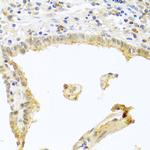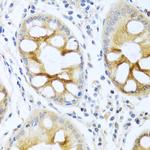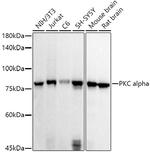Search Thermo Fisher Scientific
FIGURE: 1 / 3
PKC alpha Antibody (PA5-87400) in IHC (P)



Product Details
PA5-87400
Species Reactivity
Host/Isotype
Class
Type
Immunogen
Conjugate
Form
Concentration
Purification
Storage buffer
Contains
Storage conditions
Shipping conditions
RRID
Product Specific Information
Positive Samples: Jurkat, K-562; Cellular Location: Cell membrane, Cytoplasm, Mitochondrion membrane, Nucleus, Peripheral membrane protein
Immunogen sequence: MTKHPAKRLG CGPEGERDVR EHAFFRRIDW EKLENREIQP PFKPKVCGKG AENFDKFFTR GQPVLTPPDQ LVIANIDQSD FEGFSYVNPQ FVHPILQSAV
Target Information
The PKC family of serine/threonine kinases, including PRKCA (PKC alpha), is activated intracellularly by signal transduction pathways. In humans, at least 12 different PKC polypeptides have been identified. These isoforms differ in primary structure, tissue distribution, subcellular localization, mode of action in vitro, response to extracellular signals, and substrate specificity. PKC alpha, beta I, beta II, and gamma form the conventional family; their activities are Ca2+- and phospholipid-dependent. Protein kinase C (PKC) can be activated by calcium and the second messenger diacylglycerol. PKC family members phosphorylate a wide variety of protein targets and are known to be involved in diverse cellular signaling pathways. PKC family members also serve as major receptors for phorbol esters, a class of tumor promoters. Each member of the PKC family has a specific expression profile and is believed to play a distinct role in cells. The protein encoded by this gene is one of the PKC family members. This kinase has been reported to play roles in many different cellular processes, such as cell adhesion, cell transformation, cell cycle checkpoint, and cell volume control. Knockout studies in mice suggest that this kinase may be a fundamental regulator of cardiac contractility and Ca(2+) handling in myocytes.
For Research Use Only. Not for use in diagnostic procedures. Not for resale without express authorization.
References (0)
Bioinformatics
Protein Aliases: aging-associated gene 6; EC 2.7.11.13; FHC; FTH; FTHL6; kinase PKC-alpha; KPCA; MGC104426; PIG15; PKC III; PKC-A; PKC-alpha; PKC-III; PLIF; Protein kinase C alpha type; protein kinase C, alpha; protein kinase c-alpha
Gene Aliases: AAG6; AI875142; PKC-alpha; PKCA; PRKACA; PRKCA
UniProt ID: (Human) P17252, (Mouse) P20444
Entrez Gene ID: (Human) 5578, (Mouse) 18750, (Rat) 24680

Performance Guarantee
If an Invitrogen™ antibody doesn't perform as described on our website or datasheet,we'll replace the product at no cost to you, or provide you with a credit for a future purchase.*
Learn more
We're here to help
Get expert recommendations for common problems or connect directly with an on staff expert for technical assistance related to applications, equipment and general product use.
Contact tech support
